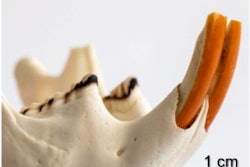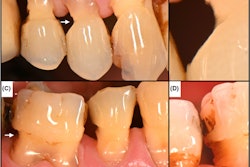
A main alkaloid in cacao beans that is found in chocolate may slow dental erosion, lesion progression, and stimulate an intact layer, according to new research that will be presented at the International Association for Dental Research (IADR) General Session and Exhibition.
Compared to rinsing with water, a rinse made with the alkaloid -- theobromine -- significantly prevented the demineralization of enamel from human samples, according to a research poster that Summer Booth, a second-year dental student at the University of Colorado School of Dental Medicine in Aurora, will present at IADR, which is being held March 13-16 in New Orleans.
"Theobromine rinse has a significant protective effect on the demineralization of enamel," Booth wrote.
To determine if theobromine could prevent demineralization and lesion progression, 10 enamel samples from humans were placed in a model mouth system that simulated realistic salivary flow with three times daily lactic acid challenges. During the five-day trial, the test group (THBr) received a rinse of 300 ppm of theobromine rinse two times daily, and the control group received a water rinse twice per day. Then, the samples were microscopically imaged. Imaging software was used to analyze them for erosive loss and lesion depth, according to the poster.
The theobromine rinse significantly reduced enamel erosion [theobromine rinse = 46 ±14 μm versus water rinse = 124 ±37 μm, p < 0.0001]. Also, the theobromine rinse significantly reduced lesion depth [theobromine rinse = 43 ±20 μm versus water rinse = 83 ±20 μm, p = 0.0003]. In the theobromine samples only, a mineralized layer of 33 ±22 μm thick was observed at the surface of the lesion, according to the results.
In the future, more studies are needed to confirm these results and to analyze the composition of the mineralized layer observed, she wrote. Furthermore, additional studies are planned to compare the data to a fluoride rinse, as well as a trial with theobromine and fluoride to see if the combination can prevent erosion even better together, Booth said in a university news article.
"Despite fluoride being consistently proven as the gold standard to protect teeth from decay, there is still a growing population of fluoride-concerned people," Booth said in the article. "If this becomes a larger issue in the future, theobromine could serve as an alternative in maintaining the enamel mineralization in patients who desire such an option."




















